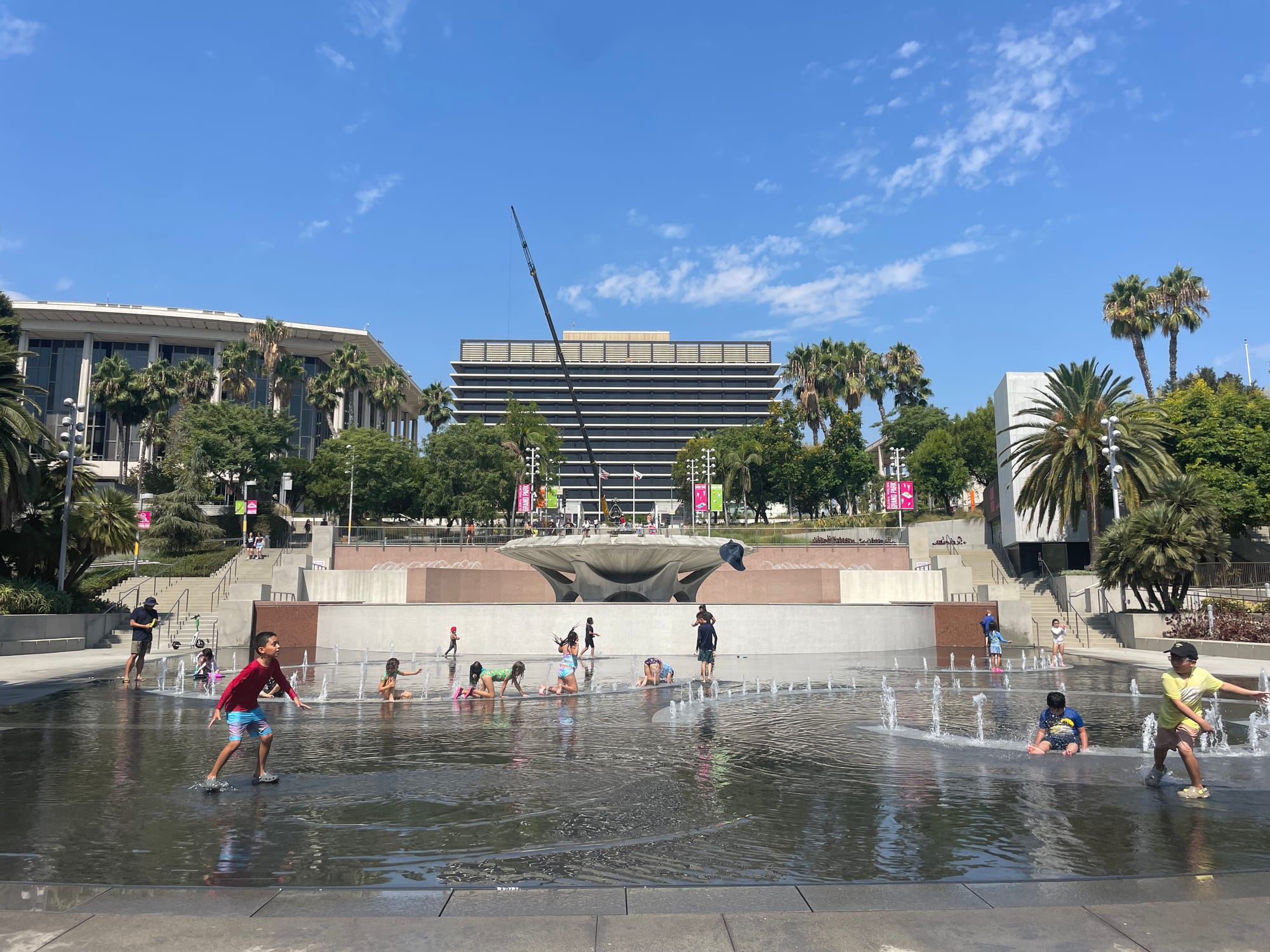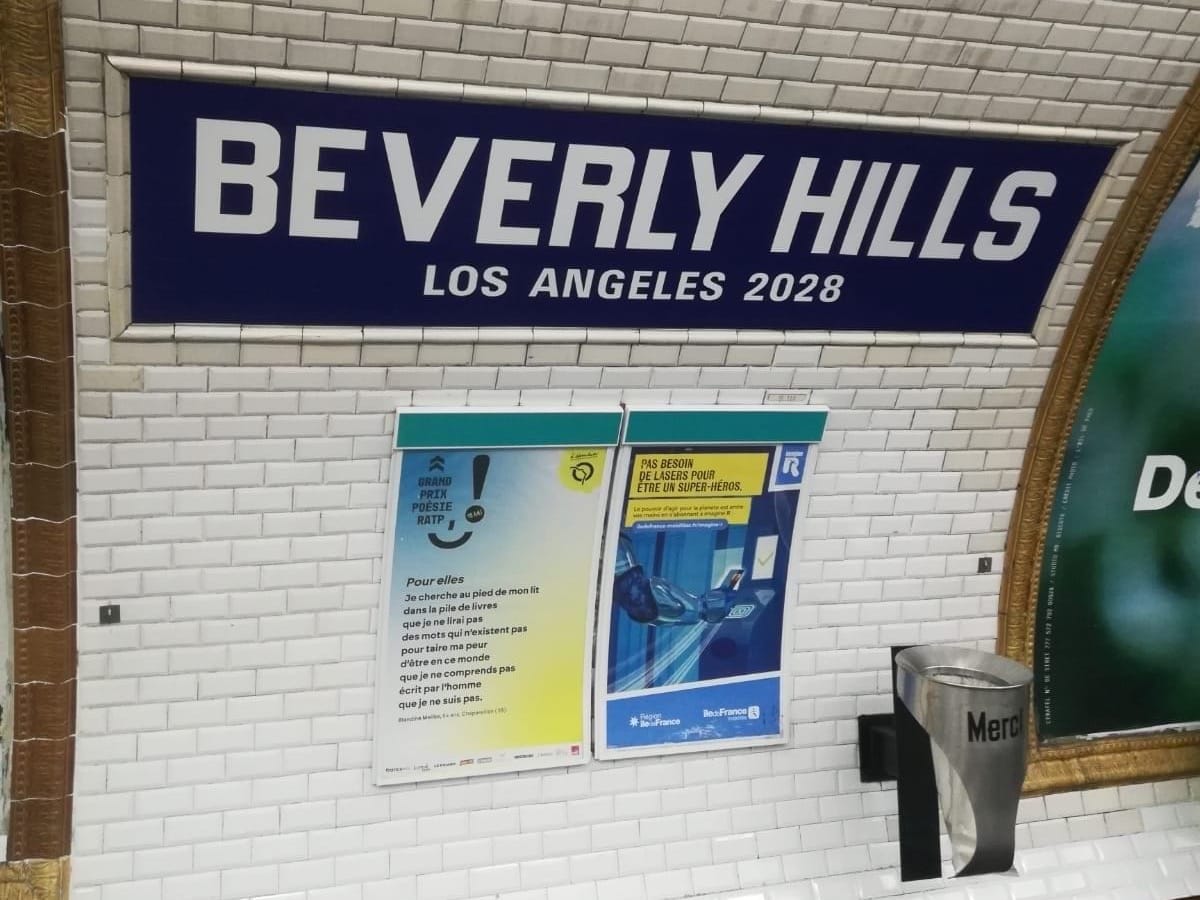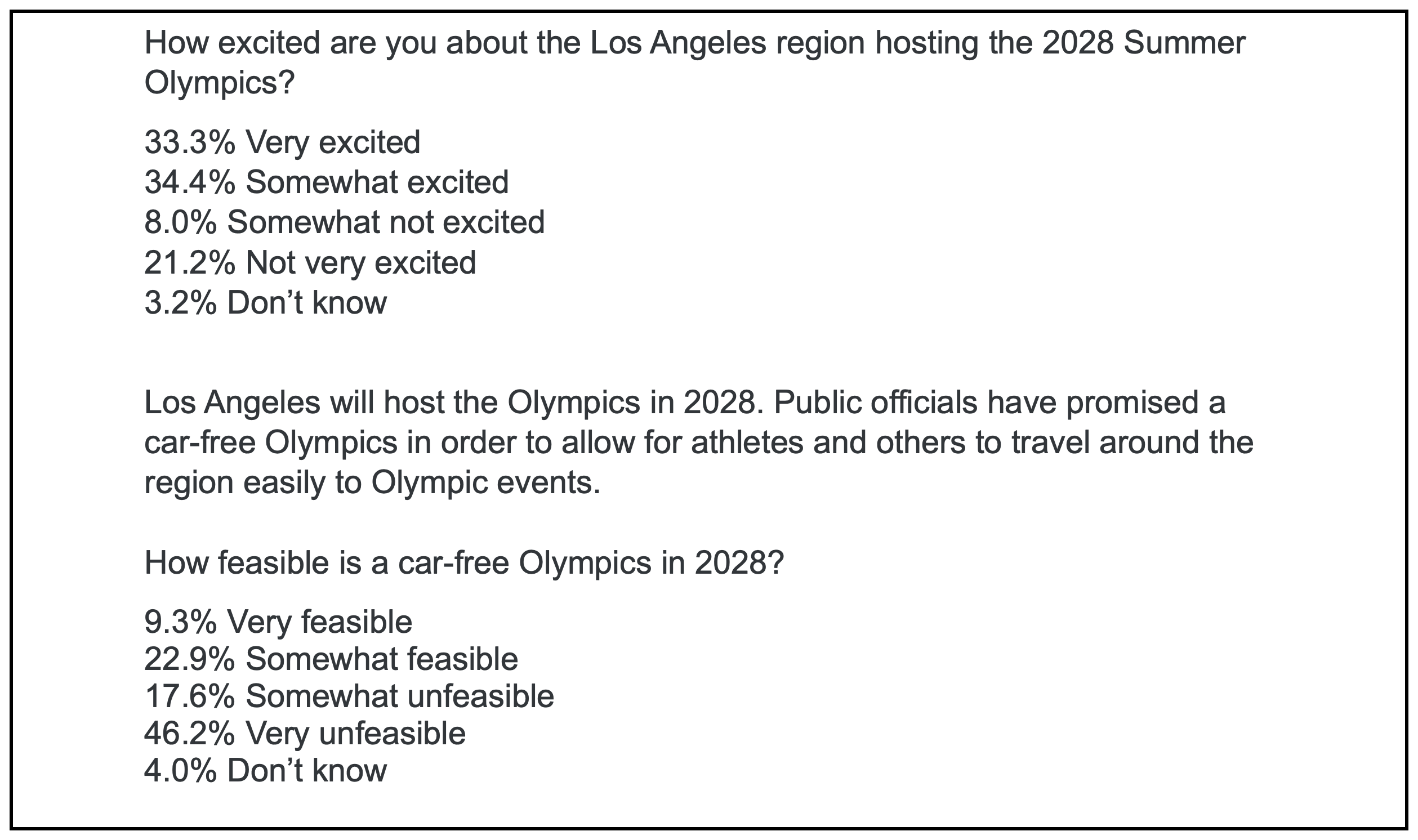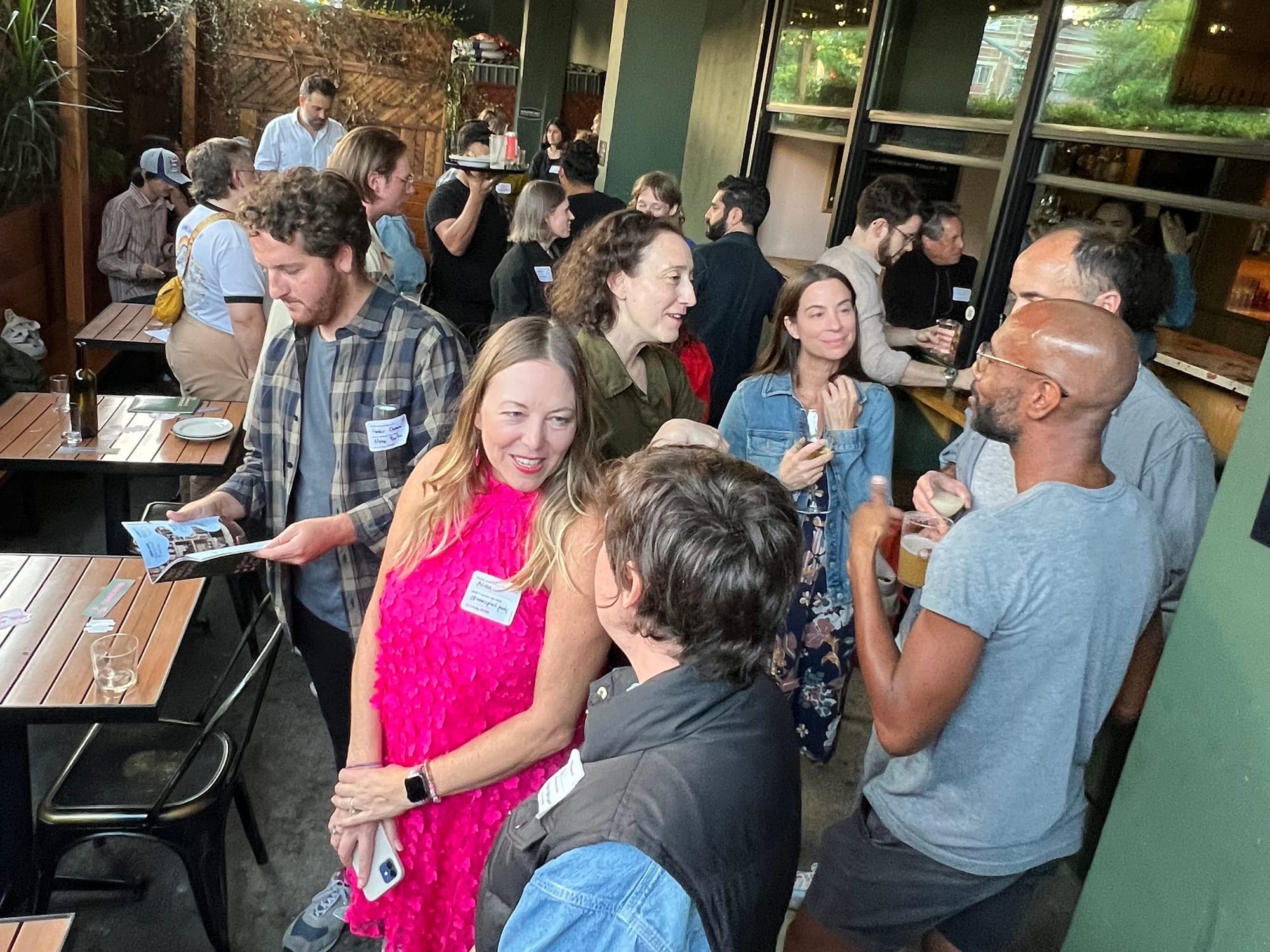The transit-first (no, really) games
In the end, LA28 put the events where the public transportation will already be
Here's a chance to have a broader conversation about the role gathering places play — and can play long after the games — across the entire region

With 800 artists exhibiting work at 70 institutions through February, the Getty's PST ART: Art & Science Collide has been very fittingly dubbed the "Olympics of art." The kickoff event even had serious opening ceremony vibes as "daytime fireworks" by Cai Guo-Qiang dazzled crowds at the Coliseum. (And also showered them with noise and debris.) But for art critic Carolina Miranda, trying to hit all the shows is giving her pre-2028 jitters. "Doing PST on public transit is already a mental test," she told me. The Huntington Library, for example, which is exhibiting Storm Cloud: Picturing the Origins of Our Climate Crisis, offers free parking (of course!) but its public transportation directions lament that the museum is "located in a residential area, and the nearest bus stops are approximately 1 mile away." Miranda braved the transit trip and documented some rather discouraging last-mile infrastructure. She recommends the more accessible We Live in Painting: The Nature of Color in Mesoamerican Art at LACMA: "Shout out to the 720 bus."
In practice, PST is a smaller-scale version of our upcoming Cultural Olympiad, the IOC-mandated arts festival that's run concurrently to the Olympics since the 1950s. In 1984, LA made it our own with a customized name — the Olympic Arts Festival — and a two-month, 400-performance program that asserted LA's cultural capital status on the world stage. "The Olympic Arts Festival in 1984 had very positive repercussions for Los Angeles that were beyond what anyone could have imagined at the time," says Aaron Paley, longtime cultural festival producer and co-founder of the newly formed nonprofit Los Angeles Tomorrow. It's a feat local arts leaders are eager to repeat. But Paley says he approached LA28 about the Cultural Olympiad in 2018, when LA had won the bid with an unprecedented ten years to plan. And LA28 representatives said to him: "Could you come back in five years?"
So here we are. Six years, in fact. In June, Maria Arena Bell was appointed as the Cultural Olympiad director. A series of listening sessions initiated by the county in partnership with the city are now underway. But despite coalition letters requesting clarity on the outreach, vision, and fundraising strategy for the Cultural Olympiad, there's still nothing public from LA28. There's not even a page on the LA28 website, aside from a release about Bell's appointment.
After going to Paris, which staged hundreds of Cultural Olympiad events from April to September and designated public festival sites in every arrondissement and programmed 40 free cultural hubs, LA officials have got to be alarmed.
Last week, councilmembers filed a motion to "request LA28 to report on the status of planning for the Olympic Arts Festival for the LA28 Games, including how the Festival will engage the broadest range of performing arts centers, museums, galleries, and other types of venues throughout the City of Los Angeles." And there's another motion (actually two motions; one is more megaevent-agnostic) to "request LA28 to develop at least 28 locations throughout the City, in every Council District, including, but not limited to, non-city owned spaces, where viewing party locations and activations can be hosted to serve Angelenos." The second motion also asks that the city and LA28 "identify funding sources, public and private" for these spaces. This is something that the city of LA needs to get working on yesterday, particularly with the World Cup in less than two years. Prolific Olympics-chronicler Rich Perelman notes that during the 1996 Summer Olympics Atlanta failed to plan and program such spaces, and local parks exploded into "ambush marketing sites."
But before we ask LA28 to stick two pins marked "culture" in every council district map, the city of LA needs to have a serious discussion about funding its existing public spaces. The councilmembers who introduced these motions can't even maintain the parks we have. What is the plan to clear billions of dollars of backlogged maintenance to get our civic and cultural hubs in shape to actually use them? And when one-third of LA residents aren't within a 10-minute walk of a park, shouldn't we actually use this opportunity to create a lot more public spaces? Here's a chance to have a broader conversation about the role gathering places play — and can play long after the games — across the entire region.
Perhaps most important to think about, as we tap our personal PST itineraries into Google Maps over the next few months: we need to also start coordinating walking, biking, and transit access to all these cultural destinations now — or our "car-free" plans for the next few summers will fall catastrophically short. 🔥

During our last heatwave I wondered: what if the grid fails in 2028? The next day, so many people lost power, some for three days. The Hollywood Bowl had to cancel a show! Can you imagine the lights going out in the middle of an Olympic event? LADWP tried to say the number of customers without power was "relatively low." However, as LAist so elegantly phrased it: "the hottest neighborhoods, including areas with fewer trees and green space that help cool concrete, have been hit with the most outages." Now another round of dangerous heat is upon us. The Long Beach marathon will start a half-hour earlier on Sunday. Last month a runner died after running a Disneyland half-marathon where he complained about holding the event in a heatwave.
Where's the Olympic wage? Back in May, I reported on the campaign to raise the minimum wage for tourism workers to $25/hour immediately and $30/hour by 2028. A long-awaited economic impact report is finally out, and unsurprisingly, the city's analysts agree that paying tourism workers more would be great for the local economy. Now all workers need is for the motion to be brought up for a vote. On Saturday, workers marched through downtown, ending at the Graffiti Ghost Towers, which where they demanded the city buy the towers and turn them into affordable housing. (I agree!) This week, tourism workers are back at City Hall again — here's how to voice your support.
Over at the CNBC Games Plan Summit, Mayor Karen Bass talked about homelessness and had a good explanation of LA's "car-free" goals. We also got some behind-the-scenes: Tom Cruise was paid nothing for the closing ceremonies — because Olympics run on volunteers! — and it sounds like the city turned the Hollywood sign webcams off to do the stunt? LA28's Casey Wasserman was then asked onstage about allegations of "serial affairs" and he reiterated that he would not step down: "I’m going to do my job and do it till the end." The Wrap reported that LA28's chief legal officer Tanja Olano resigned in the wake of this response. And the following week, LA28's senior VP of human resources Kristina Guillen also left. That's four top-level staff departures just this year. I'm surprised there's not more reporting from local outlets on this. Or maybe I'm not.
So maybe we can do this "car-free" thing after all? A Bloomberg survey of vehicle-miles traveled finds that only 10 out of the 100 most populous U.S. cities have kept driving below 2019 levels. Who's #1? Los Angeles, baby, with a 17 percent decline in average daily VMT over the last five years. Now pair that with another encouraging stat: Metro's ridership is up for the 21st straight month. Even more intriguing is Metro's analysis of what's driving overall growth: leisure ridership, especially on the weekends. "Metro provided special event support to nearly 50 transit-accessible events at large venues and entertainment parks in the LA region." It sounds like a lot of smart Angelenos already know to leave the car at home.
And in events I was definitely not invited to, Rick Caruso hosted a party at the Grove for air taxi company Joby, which he said he wants to operate at all Caruso properties by the Olympics. Joby competitor Archer received FAA approval earlier this year with a plan to start making commercial trips by 2026. (Remember that Paris also promised air taxis for the Olympics that never got off the ground.) Funny that Caruso tried so hard to halt the now-approved Television City project next door by citing "traffic" concerns — all while he's formulating his own plans to turn the roof of the Grove's parking garage into a helipad. Can't wait for the Americana at Brand Memes.

At the end of the Paralympics, Paris's RATP changed the names of six Métro stations to famous — and not necessarily subway-adjacent — LA neighborhoods in what was called a "transit handover." (Our Metro only changed the exterior of the Mariachi Plaza E line station, which was kind of weird.) On one hand, these kinds of things are extremely dumb and I personally don't think we should spend staff time doing them. On the other hand, this rules because Beverly Hills, which fought the subway for decades, does not want any Metro station to be named "Beverly Hills."

I need to bestow some kind of special award upon this Financial Times column which comes to a Caruso-esque conclusion that Olympics-goers will need Blade Runner air taxis to avoid LA's crime-ridden subways. Genuine kudos to LA28 VP of transportation Sam Morrissey for calling the author out on this narrative to his face: "More people are dying in traffic collisions on our roads every day than they are on transit," he says. "So I push back on the idea that it's not safe." Correct. Now read these stories instead...

What a night! Thanks to Torched fans for making it out to the launch party. Huge thanks also to Thunderbolt, the best bar in LA, for hosting us! If you missed grabbing your stickers, don't worry, subscribers will get a separate email with a form to fill out so I can get them to you. And if you missed the party — be sure to become a paid subscriber so you can come to next year's event!
Coming up Monday is the next Torched Talks where I'll be speaking with Chris Torres about the Festival Trail concept — a proposed 22-mile non-vehicular corridor that's gaining grassroots momentum. Join us October 7 on Zoom at 3 p.m. Here are all the details. See you then!